LITERATURE Constitution of the Russian Federation Law of the Russian Federation of December 29, 2012 No. 273-FZ “On Education in the Russian Federation” Dmitrieva T.P. Organization of activities of the coordinator for inclusion in educational institution. Inclusive education. Issue 3. - M .: School book, Activities of the head of an educational organization when including students with disabilities and disabled children in the educational space: teaching materials for managers / S.V. Alekhina and others; - M.: GBOU VPO MGPU, Leonhard E.I., Samsonova E.G., Ivanova L.I. Normalization of the conditions for the upbringing and education of children with disabilities in the context of inclusive education. Toolkit. Issue 7. - M .: School book, 2010.
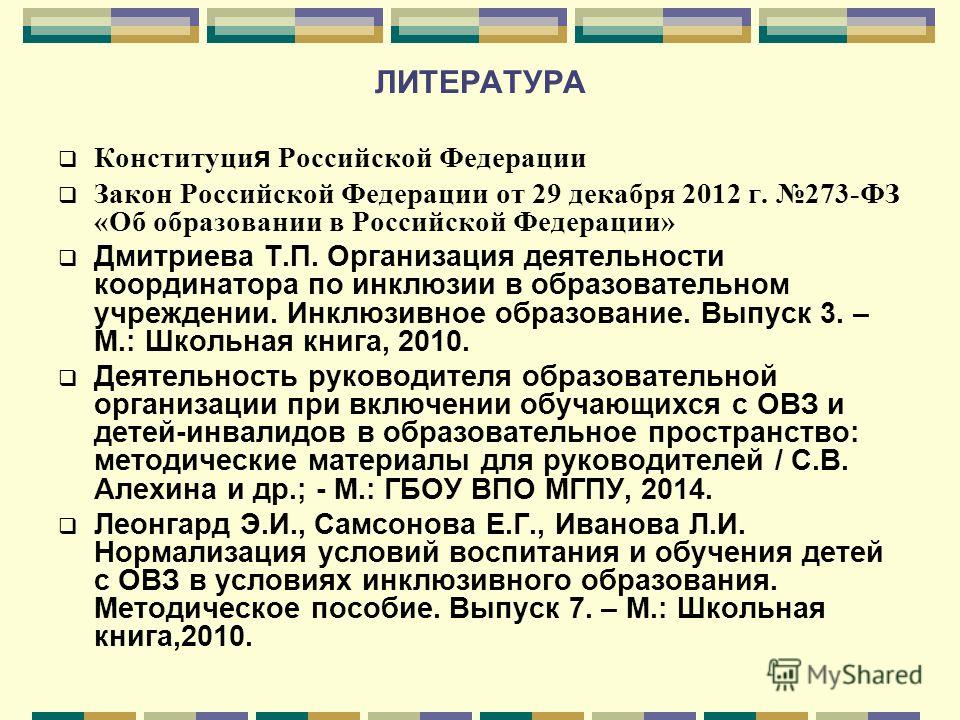
Article 79 handicapped health 1. The content of education and the conditions for organizing the training and education of students with disabilities are determined by an adapted educational program, and for disabled people also in accordance with an individual program for the rehabilitation of a disabled person. 2. General education of students with disabilities is carried out in organizations that carry out educational activities according to adapted basic general educational programs ... blind, visually impaired, with severe speech disorders, with disorders of the musculoskeletal system, with a delay mental development, With mental retardation, with autism spectrum disorders, with complex disabilities and other students with disabilities.
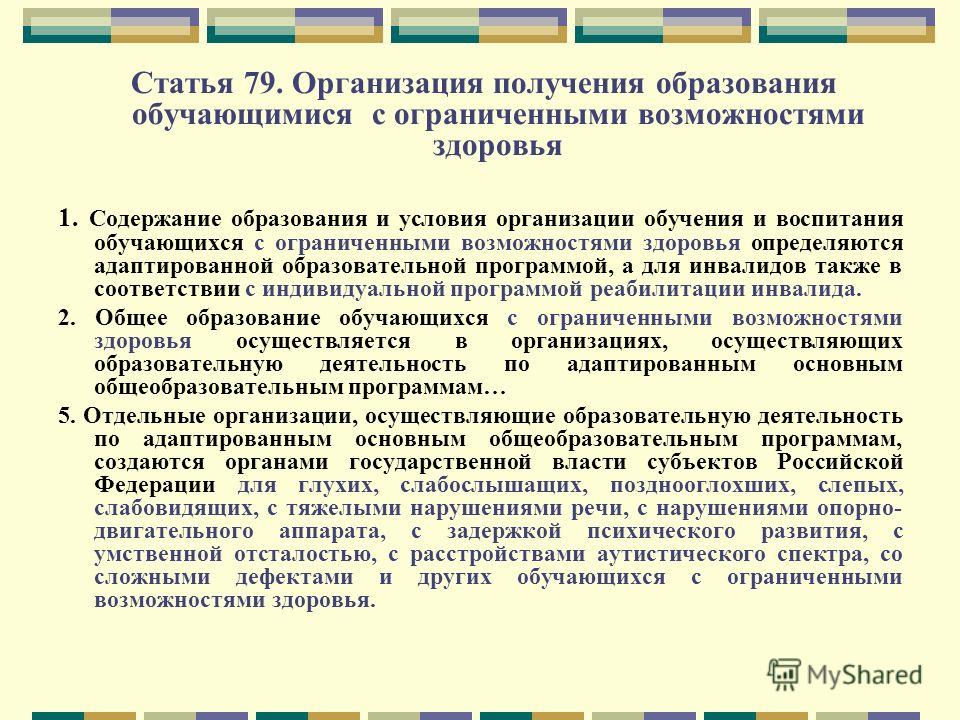
3. Special conditions for education for students with disabilities ... are understood as the conditions for training, education and development of such students, including the use of special educational programs and methods of education and upbringing, special textbooks, teaching aids and didactic materials, special technical training aids for collective and individual use, provision of services of an assistant (assistant) providing students with the necessary technical assistance, conducting group and individual remedial classes, providing access to the buildings of organizations engaged in educational activities, and other conditions, without which it is impossible or the development of educational programs by students with disabilities is difficult.
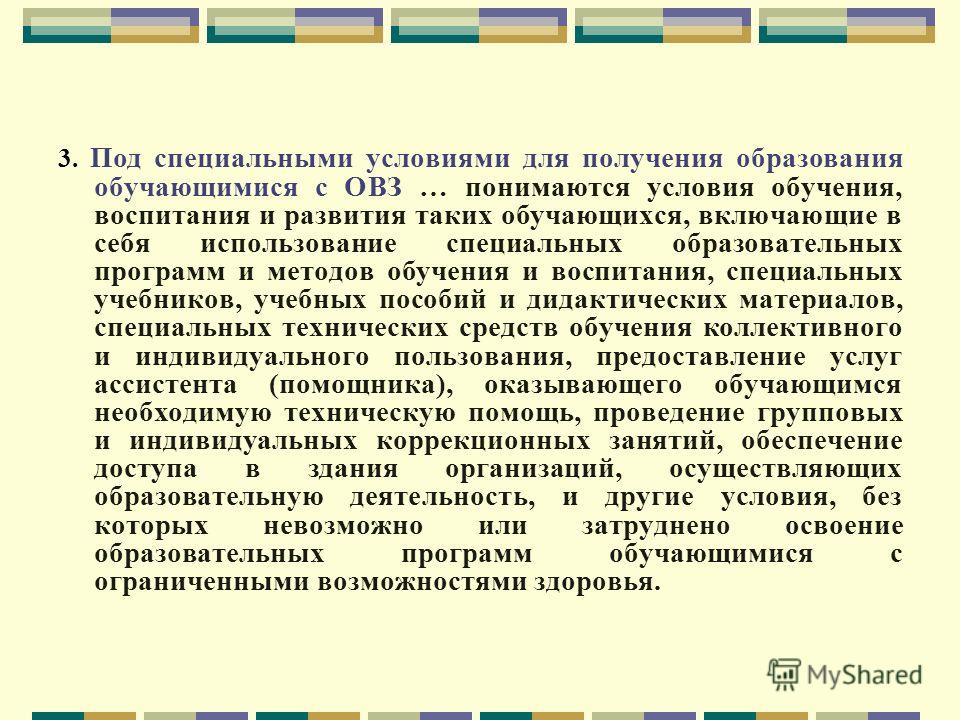
12. The state, represented by the state authorities of the Russian Federation authorized by it and the state authorities of the constituent entities of the Russian Federation, provides training for teachers who own special pedagogical approaches and methods of teaching and educating students with disabilities, and promotes the involvement of such workers in organizations engaged in educational activities .
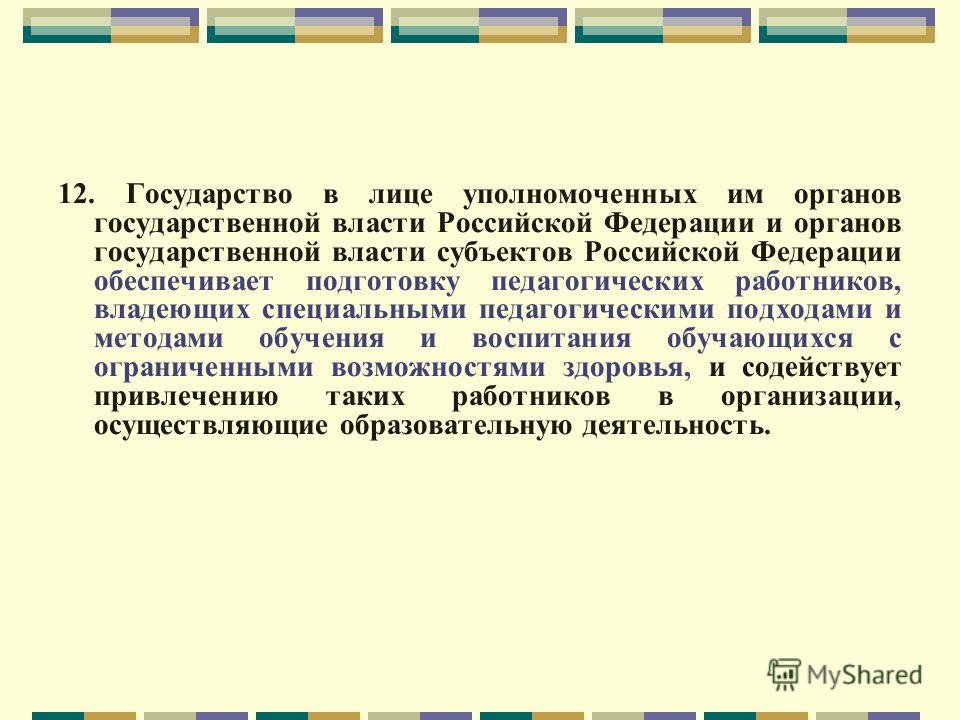
ORGANIZATIONAL SUPPORT Includes: Creation of a regulatory and legal framework for inclusive education in an educational organization. Organization of network interaction with external organizations. Organization of food and medical care necessary to support a child with disabilities in the educational process. Financial security. Logistics.
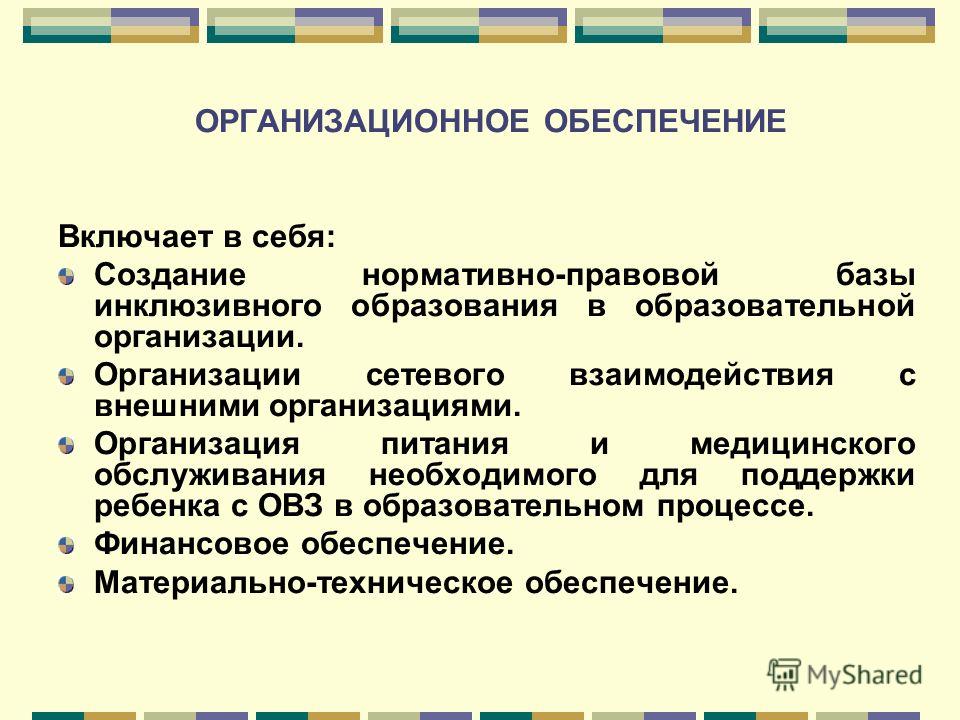
REGULATORY FRAMEWORK 1. The entire legal framework that fixes the rights of a child with disabilities. 2. Development of appropriate local acts that provide effective education for other children as well (for example, the most important local regulatory document should be considered the Agreement with parents, which will fix both the rights and obligations of all subjects of the inclusive space, provide for legal mechanisms for changing the educational route in accordance with with the characteristics and capabilities of the child, including new ones that arise in the process of education).
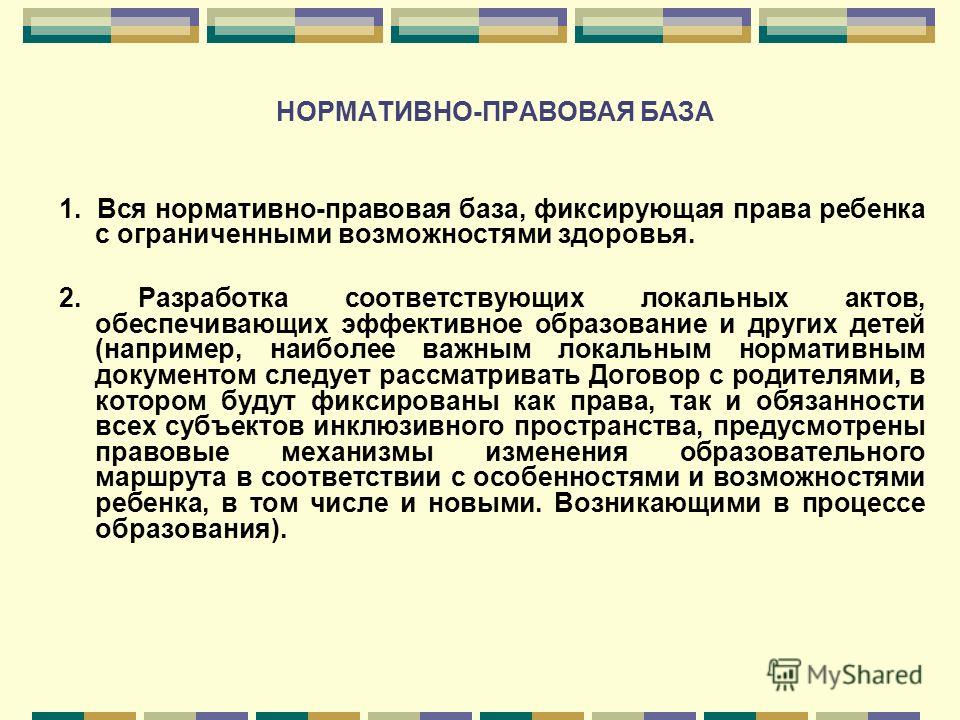
ORGANIZATION OF NETWORK INTERACTION WITH EXTERNAL ORGANIZATIONS A system of interaction and support of an educational institution from "external" social partners should be organized: - territorial PMPC, - methodological center, - PPMS center, - District and city resource center for the development of inclusive education, - special correctional) schools, - social protection agencies, - healthcare organizations, - public organizations.
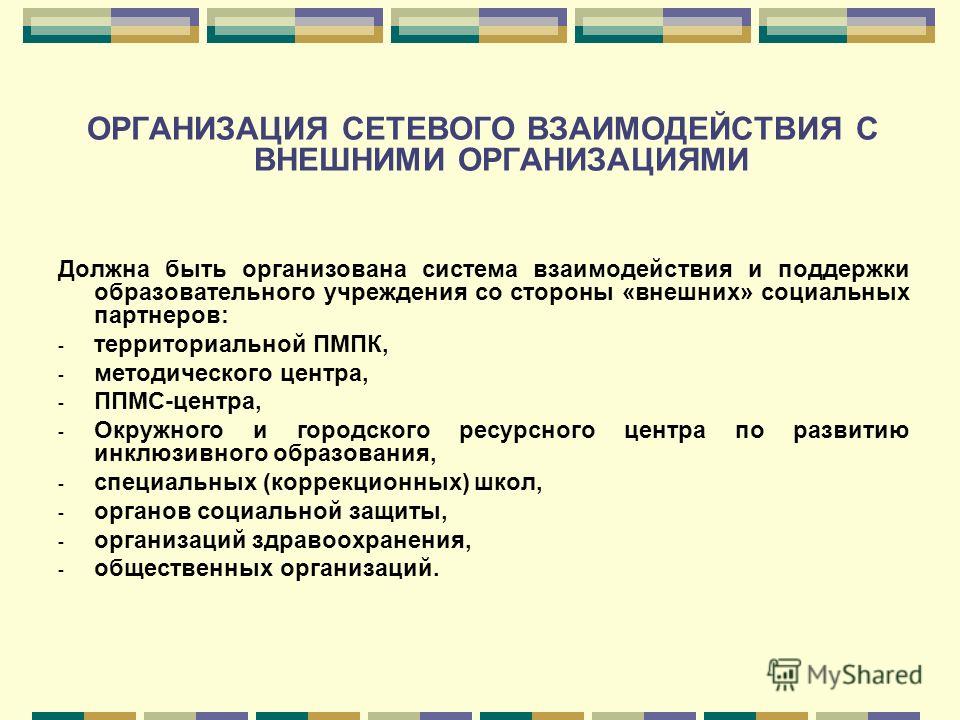
ORGANIZATION OF MEDICAL SERVICE AND NUTRITION Health saving as one of the tasks educational process. Early diagnosis of diseases of the hearing, vision, musculoskeletal system and other somatic diseases. The need for medical examination of students. Diagnostic, preventive and rehabilitation measures. Catering arrangements (for example, special devices for eating).
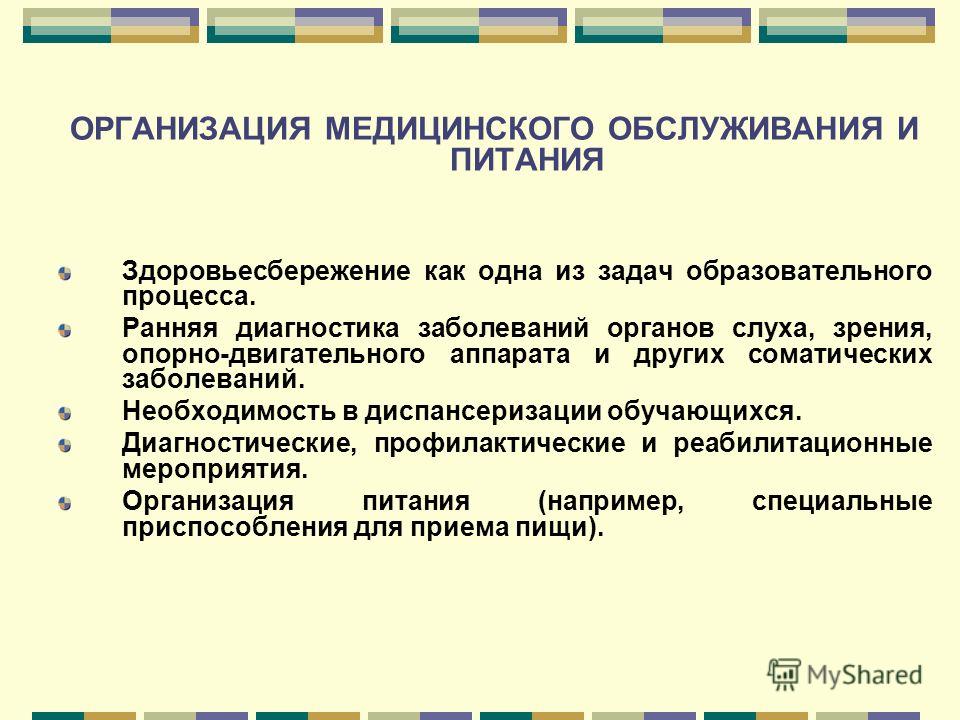
FINANCIAL SECURITY Financial and economic conditions should provide an educational institution with the ability to fulfill the requirements included in the recommendations of the PMPK and the adapted educational program developed on the basis of these recommendations, including the grounds for paying specialists who provide support, education and upbringing of a child with disabilities.
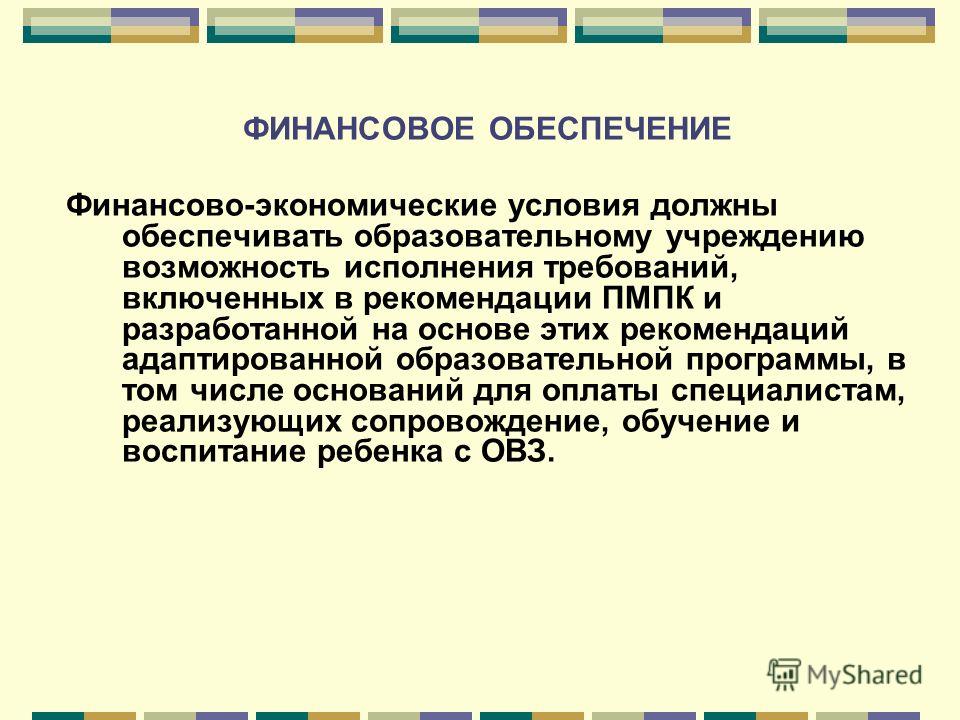
INFORMATION SUPPORT 1. A set of technological means (computers, databases, communication channels, software products created taking into account special educational needs children with disabilities. 2. Cultural and organizational forms of information interaction, the competence of participants in the educational process in solving developmental and correctional tasks of teaching children with disabilities using information and communication technologies (ICT), as well as the availability of ICT support services.
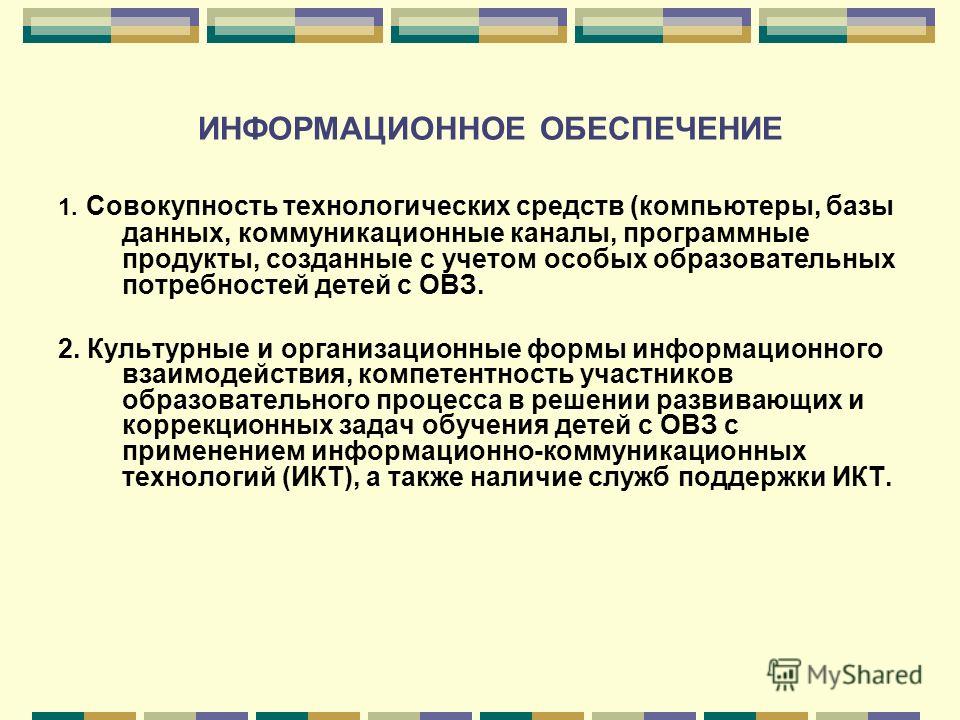
MATERIAL AND TECHNICAL (INCLUDING ARCHITECTURAL) SUPPORT compliance with sanitary and hygienic standards; the opportunity for unhindered access of students to the objects of the infrastructure of the educational institution; social and living conditions, taking into account the specific needs of a child with disabilities (availability of adequately equipped space in a school institution, workplace, etc.); fire and electrical safety, taking into account the needs of children with disabilities.
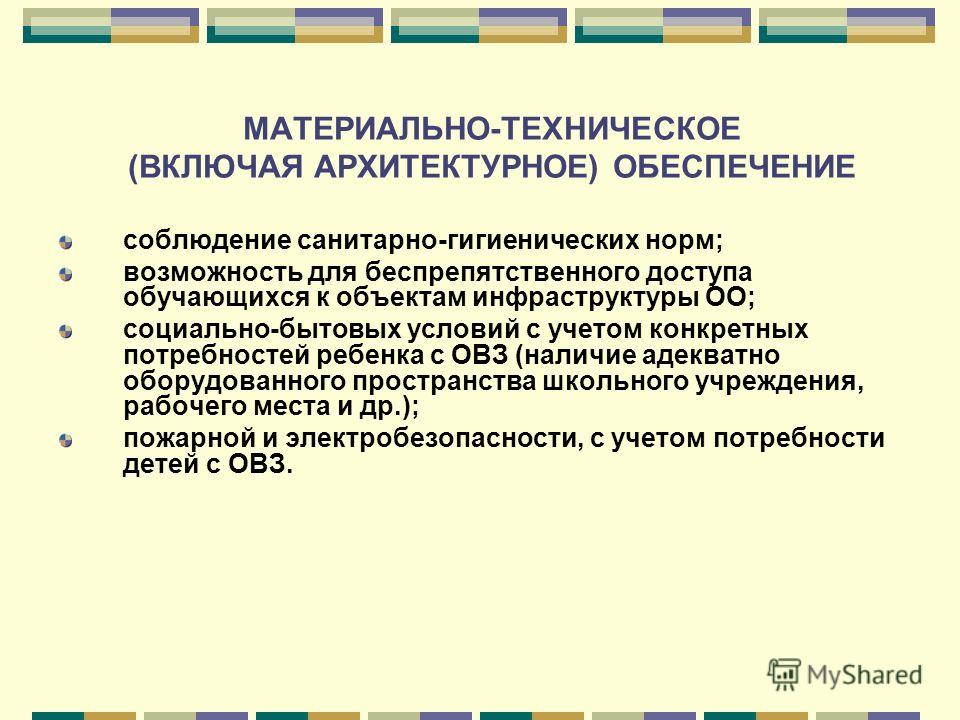
Adaptation of buildings, namely: arrangement of ramps; expansion of doorways; replacement of floor coverings; dismantling of door thresholds; installation of railings along the walls inside the building; marking device; equipment of sanitary and hygienic premises; re-equipment and adaptation of locker rooms, sports halls, canteens, classrooms, offices of narrow specialists: speech therapists, psychologists, rooms for psychological relief; creation of information corners; installation of lifting devices, etc.
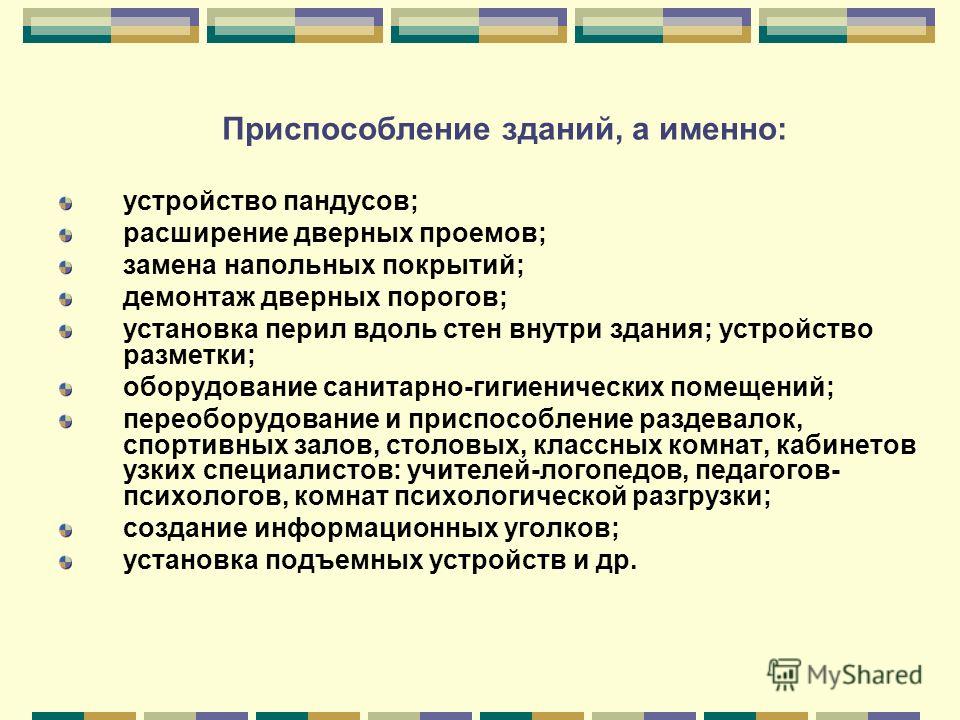
Software: special furniture (eg chairs with adjustable height); computer speech therapy, psychological programs for working with disabled children; teaching aids for the work of a teacher-psychologist, a speech therapist for working with children with speech disorders, disorders of cognitive processes, emotional-volitional spheres; sets of diagnostic methods for determining the level of speech and motor development; equipment for sensory rooms for psycho-emotional correction; abundant complexes of multi-sensory and ultraviolet equipment for sensorimotor rehabilitation and correction;
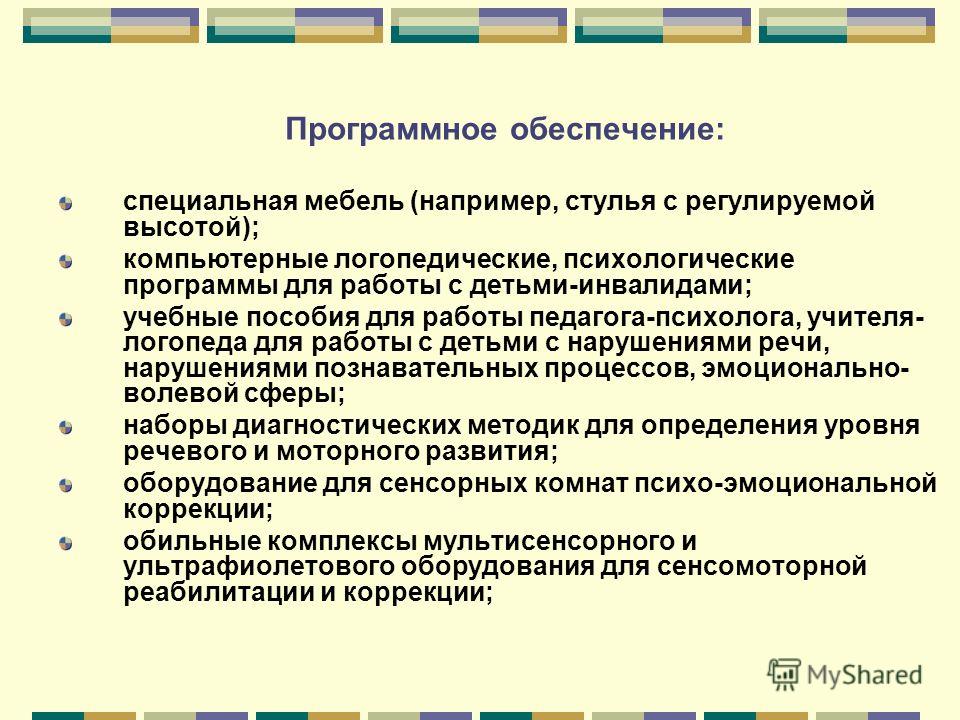
Continuation: interactive whiteboards with projectors, laptops and screens; sets of computer, telecommunications, specialized equipment and software; rehabilitation equipment; oxygen concentrators and cocktails; rehabilitation simulators (elliptical ergometers, bicycle ergometers, vibration platforms, running and massage tracks); specialized rehabilitation multifunctional health complexes; offices for logotherapy correction and correction of the psycho-emotional state;
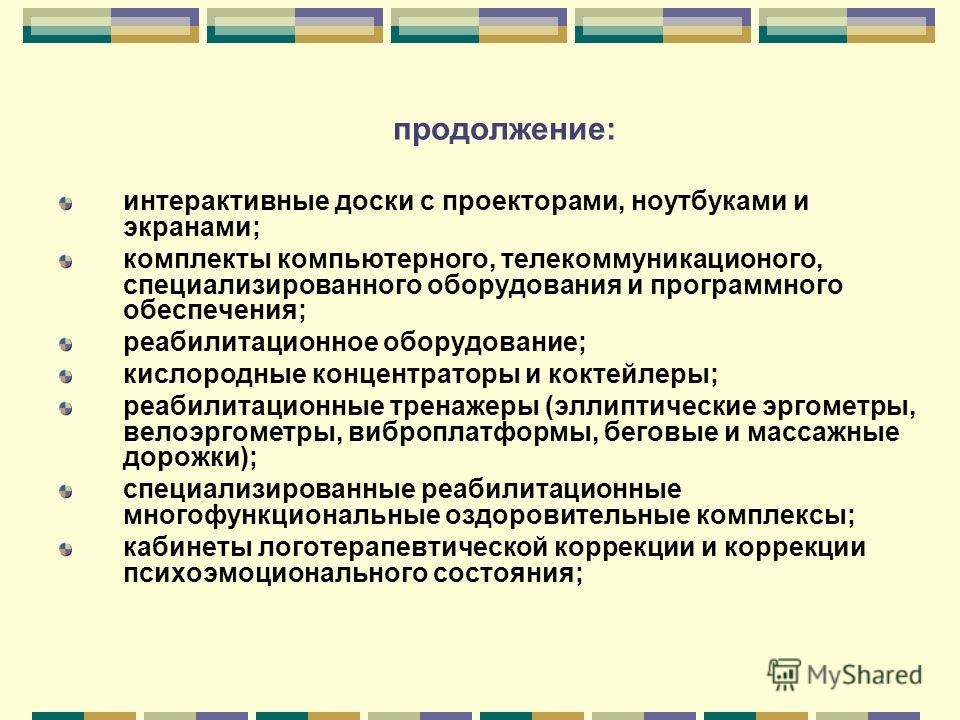
Continued: universal digital readers; digital "talking" books on SD flash cards; document cameras with computers for visual magnification of small objects and text; portable devices for reading flat-print texts; desktop electronic magnifying devices; auditory simulators "Solo-01V" (M); audio classes AK-Z(M) "Sonet-01-1"; linguodidactic complexes; PAZ and GAZEL buses, etc.
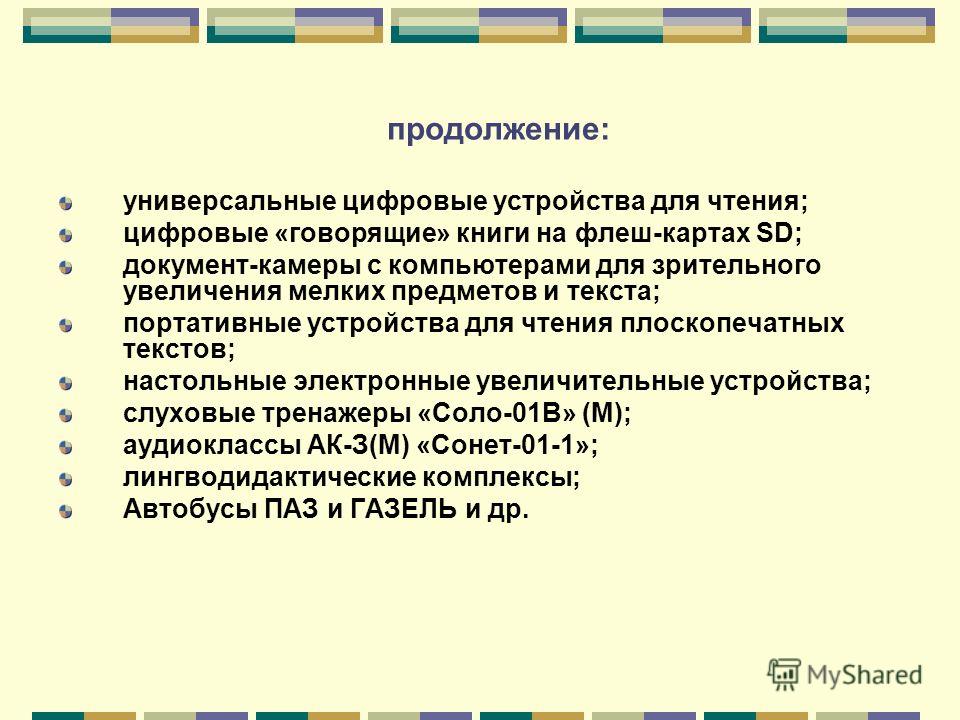
PSYCHOLOGICAL AND PEDAGOGICAL SUPPORT 1. Software and methodological support of the educational process: in accordance with the Federal State Educational Standard of Primary Education “The program of correctional work in an educational institution should be aimed at ensuring the correction of deficiencies in the physical and (or) mental development of children with disabilities and providing assistance to children of this categories in the development of the main educational program ... "
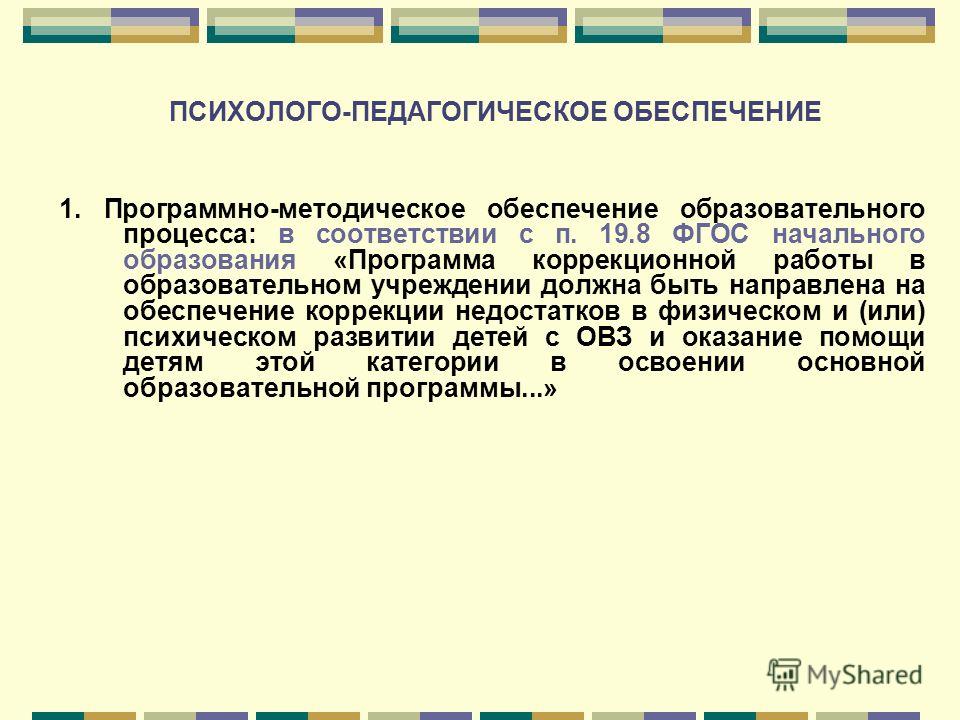
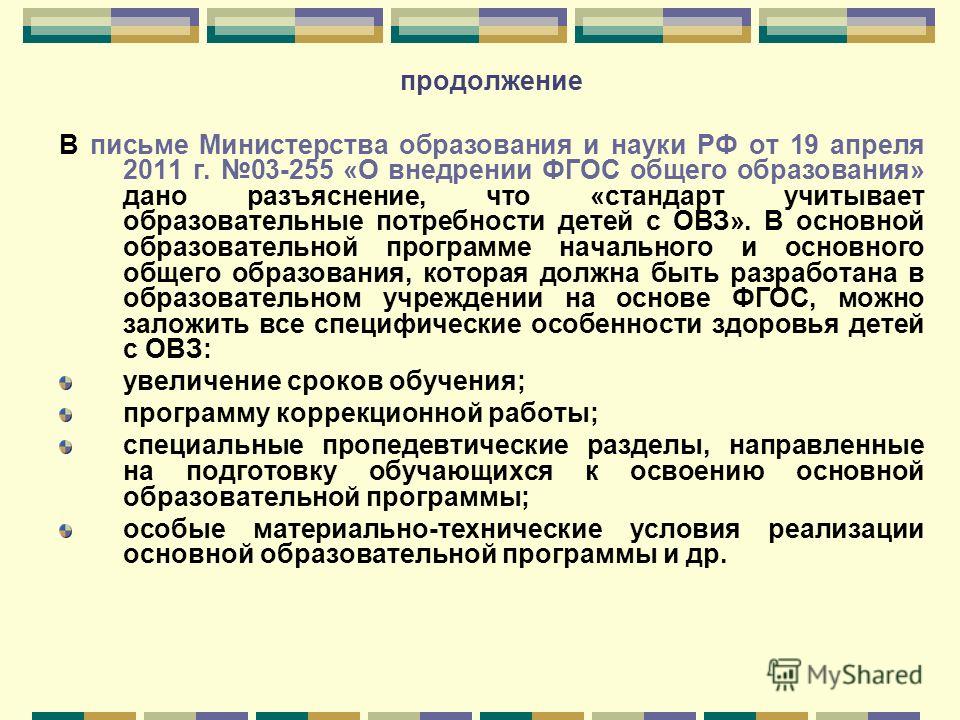
Continued The letter of the Ministry of Education and Science of the Russian Federation dated April 19, 2011 "On the introduction of the Federal State Educational Standard of General Education" clarified that "the standard takes into account the educational needs of children with disabilities." In the main educational program of primary and basic general education, which should be developed in an educational institution on the basis of the Federal State Educational Standard, it is possible to include all the specific features of the health of children with disabilities: an increase in the duration of education; remedial work program; special propaedeutic sections aimed at preparing students for mastering the main educational program; special material and technical conditions for the implementation of the main educational program, etc.

PSYCHOLOGICAL AND PEDAGOGICAL SUPPORT 1. Software and methodological support of the educational process In accordance with the provisions of the Federal State Educational Standard of Primary Education, the program of correctional work in an educational institution should be aimed at ensuring the correction of deficiencies in the physical and (or) mental development of children with disabilities and assisting children in this category in mastering the basic educational program of primary general education ....
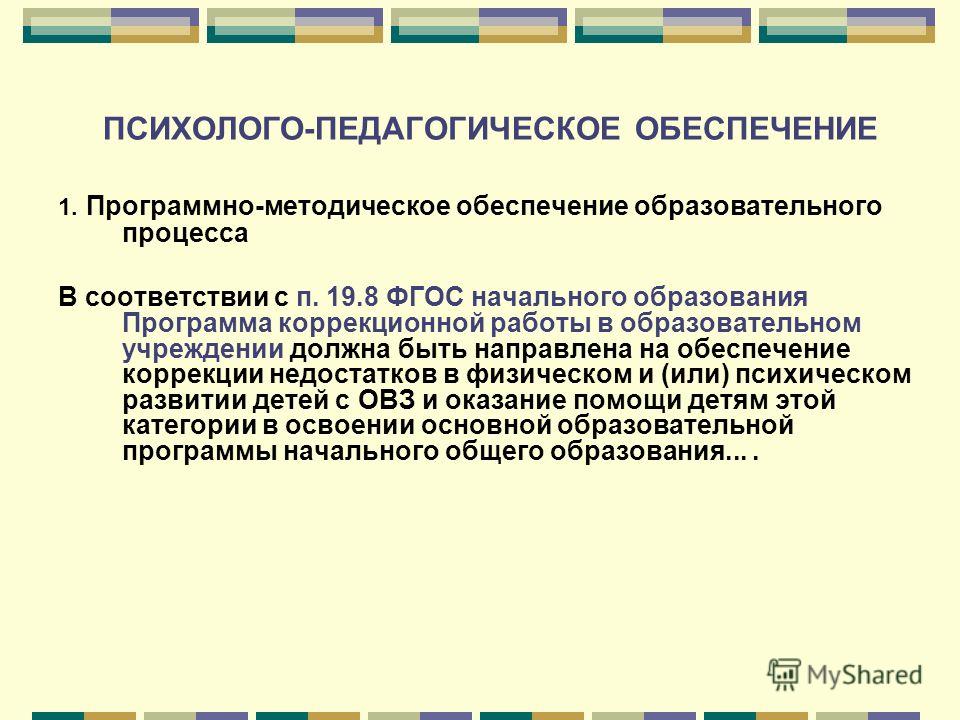
Continued The letter of the Ministry of Education and Science of the Russian Federation of April 19, 2011 "On the introduction of the Federal State Educational Standard of General Education" clarified that the standard takes into account the educational needs of children with disabilities. In the main educational program of primary and basic general education, which should be developed in an educational institution on the basis of the Federal State Educational Standard, it is possible to include all the specific features of teaching children with disabilities: increasing the duration of education; remedial work program; special propaedeutic sections aimed at preparing students for mastering the main educational program; special material and technical conditions for the implementation of the main educational program, etc.
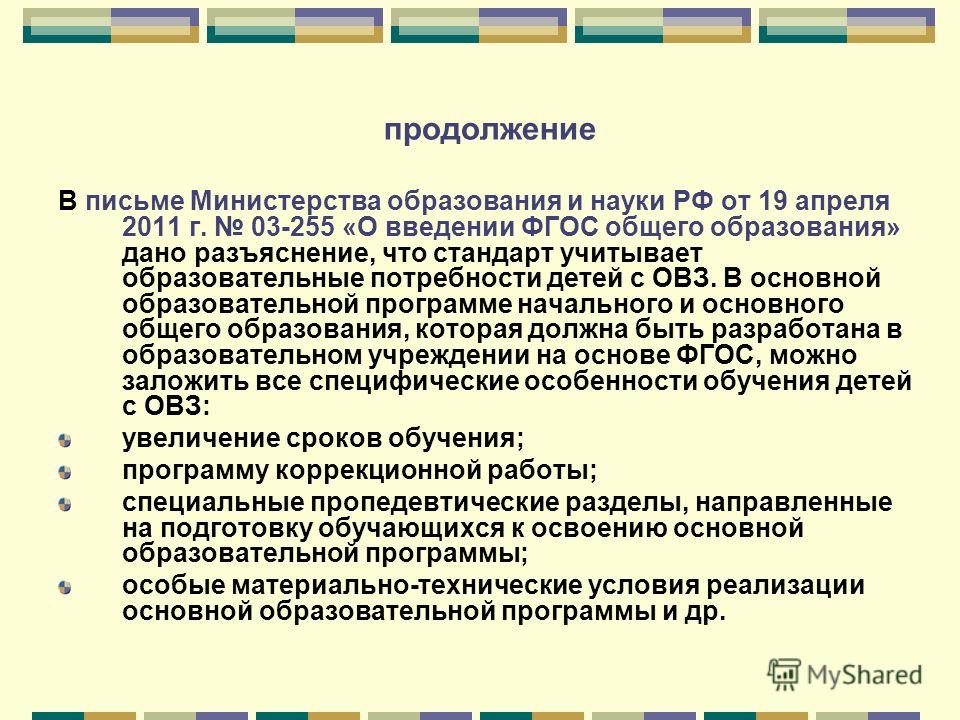
Continuation (FZ Art. 2, paragraph 28) “Adapted basic educational program is an educational program adapted for teaching certain categories of persons with disabilities, including those with disabilities, i.e. educational program of special (correctional) educational institutions of types I-VIII "Adapted educational program is an educational program adapted for teaching a child with disabilities (including those with disabilities), developed on the basis of the main general education program, taking into account the adapted main educational program and in in accordance with the psychophysical characteristics and special educational needs of the category of persons with disabilities.
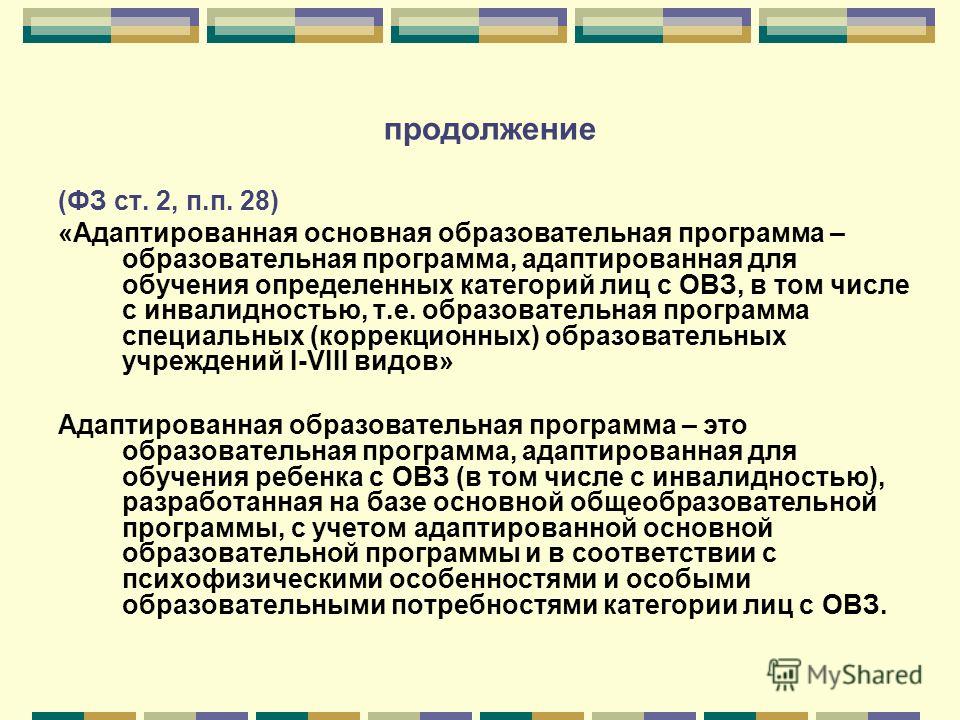
PSYCHOLOGICAL AND PEDAGOGICAL SUPPORT 2. Psychological and pedagogical support for children with disabilities in an educational institution: - to provide in the staffing table or under an agreement with the PPMS center for specialists in psychological and pedagogical support for children with disabilities and disabilities who need it; - organize the activities of specialists in the form of a council to identify, examine children, develop an adapted educational program; - organize the process of accompanying children in accordance with the developed program, etc.
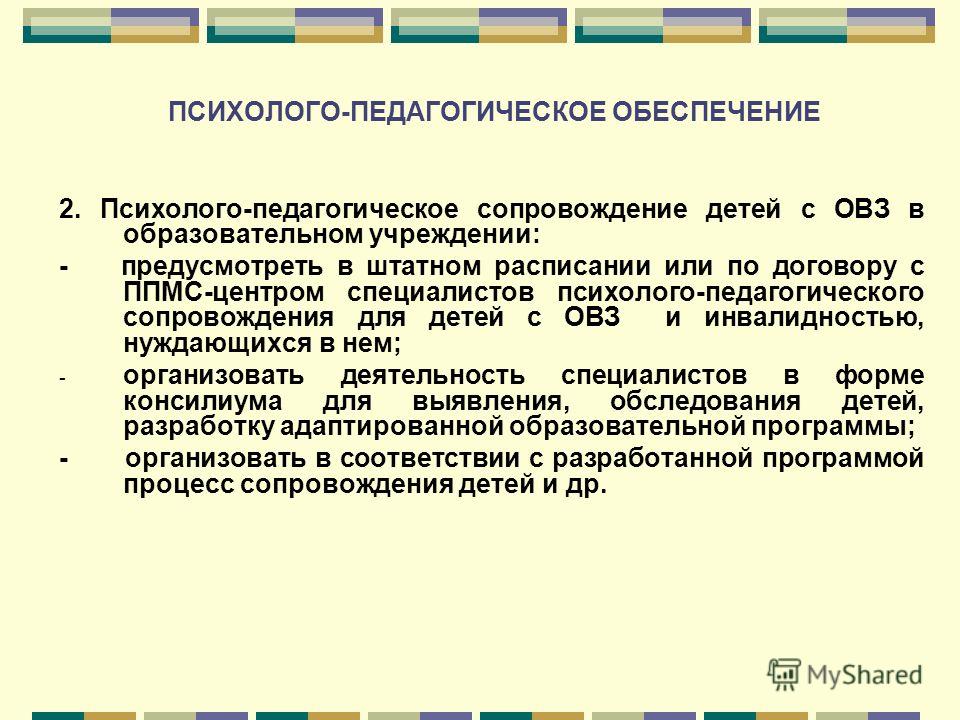
STAFFING The staffing of the educational institution with pedagogical and executive employees. Competent in understanding the special educational needs of children with disabilities; the level of qualification of pedagogical and other employees of the educational institution; Continuity of professional development of teaching staff of an educational institution in the field of correctional (special 0 pedagogy, special psychology and clinical child psychology, etc.)
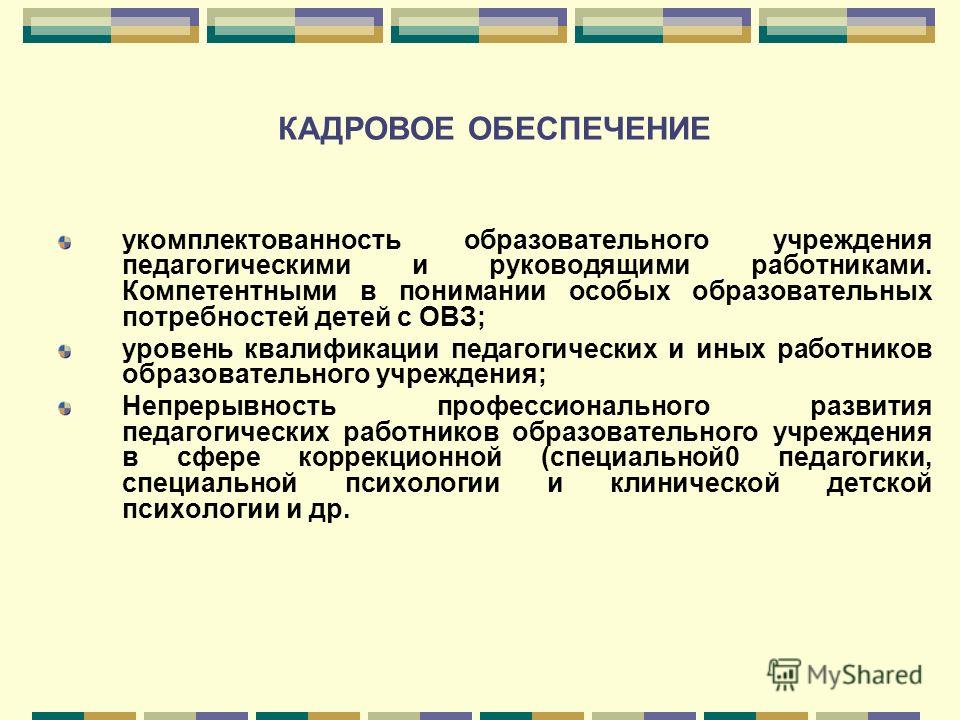
Algorithm for creating special educational conditions 1. Children with disabilities must receive medical reports with recommendations on the organization of the educational process. 2. PMPK conducts a comprehensive psychological, medical and pedagogical examination and prepares recommendations. 3. The organization's council determines the nature, duration and effectiveness of the creation of special conditions. 4. Pedagogical workers jointly draw up a program of correctional work. 5. Optimally built interaction of specialists of an educational institution. 6. Comprehensive interaction of educational institutions. 7. Material and technical support for all categories of students. 8. Individually oriented conditions.
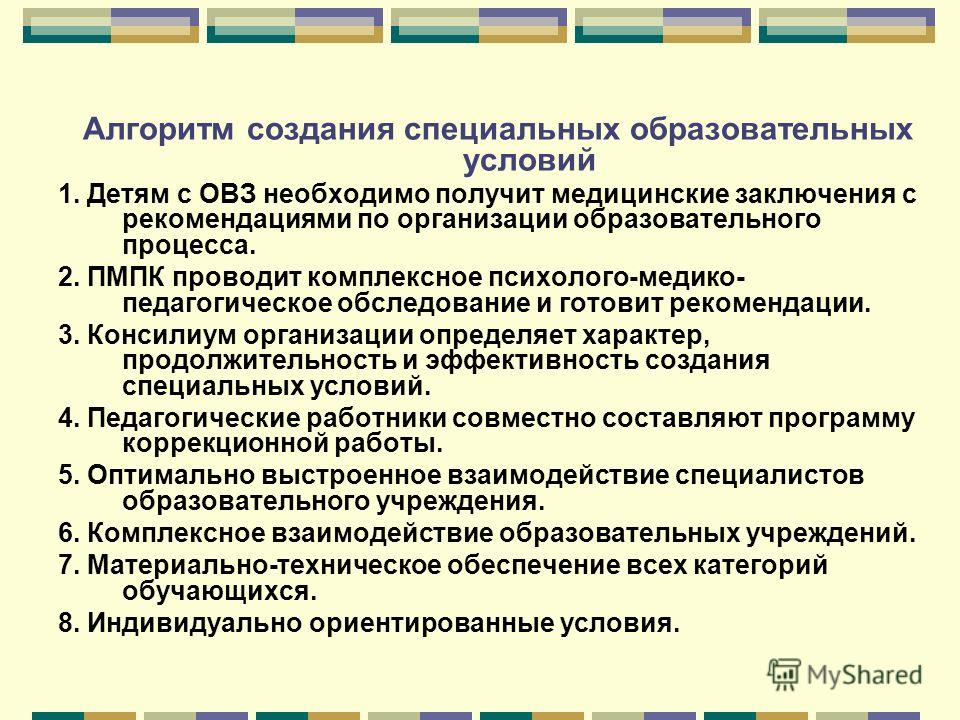
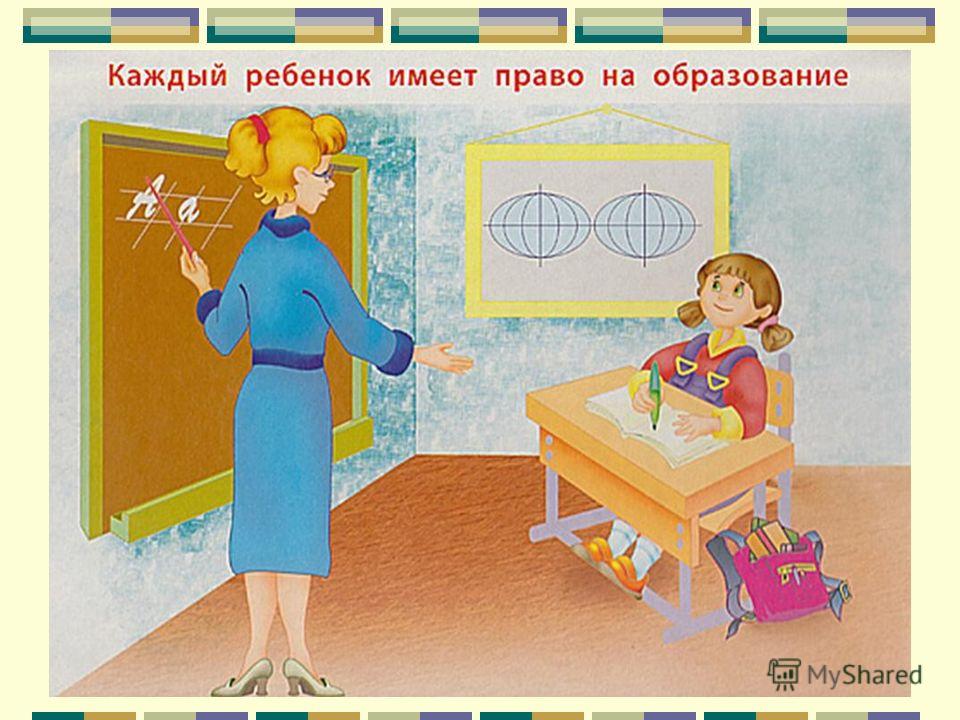
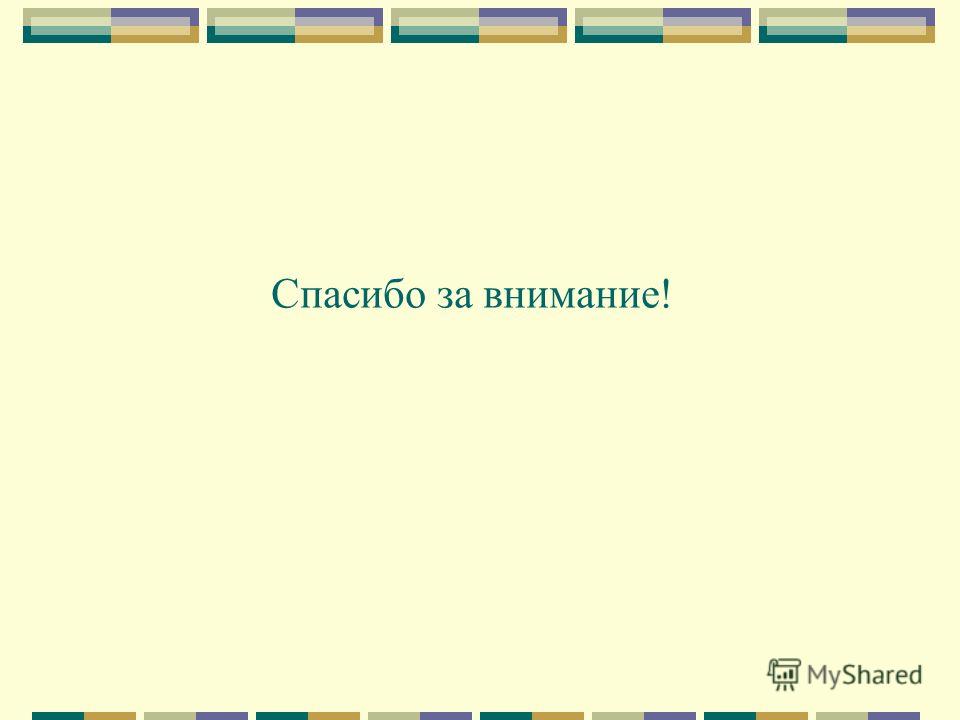
Creation of special educational conditions for students with disabilities.
Head of TOMPK,
teacher-defectologist Avdyukova S.O.
Educators have been dealing with the problem of helping children with learning difficulties for many decades. Classes were opened for leveling, compensatory education, correction, pedagogical support, adaptation - all this testifies to the search for conditions that are adequate to the mental and physical capabilities of students.
For more than half a century, legal documents of various levels have been defining the rights of children with disabilities. International level: Declaration of Human Rights (adopted and proclaimed by resolution 217 A (III) of the General Assembly of December 10, 1948, Art. 1; Convention against Discrimination in Education (approved in December 1960); Declaration of Rights persons with disabilities (adopted by resolution 3447 of the UN General Assembly on 09.12.1975); Convention on the Rights of the Child (resolution 44/25 of the UN General Assembly of 20.11.1989); Standard rules for ensuring equal opportunities for persons with disabilities (adopted by resolution 48/96 Gen. As.UN 20.12.1993 p.1, p.2); Federal level: The concept of spiritual and moral development and education of the personality of a citizen of Russia; Law "On Education in the Russian Federation" No. 273-FZ of 29.12.2012 ( For the first time, the Law "On Education in the Russian Federation" lays the legal foundation for the development of inclusive education in our country. One can list articles that are designed to protect the rights of children in this category, including Article 79. : Organization of education for students with disabilities.
Children with disabilities (HIA) - children with: hearing impairment; visual impairment; severe speech disorders; disorders of the musculoskeletal system; intellectual disorders; pronounced disorders of the emotional-volitional sphere, including autism spectrum disorders; impaired mental function; complex developmental disorders. The number of children with mental retardation is steadily increasing. Education for children with disabilities, and now children with mental retardation receive just such a status along with the recommended program, provides for the creation of a special correctional and developmental environment for them that provides adequate conditions and equal opportunities for education.
Why so much attention to children with disabilities. According to the Ministry of Health of the Russian Federation: 80% of newborns are physiologically immature, from 83 to 92% have neurological pathology, 30% have genetic disorders, there are practically no children of conditionally normally developing (basic health). In 2013, the order of the Ministry of Health of the Russian Federation on 500 gram children was issued, they are now about 2 years old, they begin to appear in preschool educational organizations, 50-60% of them will be with multiple disorders. In 2020-2021, these children will go to school, and parents will demand education. Today, Moscow experts say that 67% of first-graders are not ready to study, as a result, 67% did not master the program by the 4th grade. As for children with autism spectrum disorders, at the International Conference in Yekaterinburg in September of this year, specialists from Israel provided the following data: in 2010 there were 1 such child in 110, in 2014 - 1 in 68, in 2017 there will be 2% of such children. By law, children with autism spectrum disorders can study in a general education school, and if earlier they talked a lot about the cause of various disorders in children, now we need to talk with the teaching staff about what needs to be done, how to create learning conditions.
The head of the "Orange" school, Zitser Dima, said at the VII International Pedagogical Forum in St. Petersburg "Children have no one else but teachers", and this accurately reflects the idea why we need to talk about this today. The 21st century is called social autism by the UN. We have been living on the same floor for many years and do not know who our neighbors are, we go to visit - we say standard phrases, we have forgotten how to sign postcards - it is easier to buy with a ready-made text. Gadgets appear in children already in kindergarten and in primary school- children have to run during recess, 60% of the Internet is filled with sex, early sexualization is underway, the child is not ready to filter information himself. Parents do not talk to their children - the child cries, the mother is silent, the child asks questions, the mother is silent, 72% of parents simply avoided raising their children. Who, if not an educator, and then a teacher, will help the child and it is the teacher primary school, since thinking develops in girls up to 10-11 years old, in boys up to 11-13 years old, and then experience only accumulates. This is where you need to concentrate all your efforts and lay the foundation.
The modernization of education today is aimed at ensuring the availability of quality education, its individualization and differentiation, the systematic increase in the level of professional competence of teachers, as well as the creation of conditions for achieving a new modern quality of general education.
The time has come when teachers need to change and no one says that it will be easy. There is a sad experience in other countries: in the early 1970s, all special correctional general education schools and psychiatric clinics were closed in Italy, and children came to ordinary schools. Everything happened quickly, neither the teachers nor the children were ready, as a result, they received a colossal outburst of aggression from the mentally retarded children, which is still silent about. Therefore, in our country, reforms are taking a long time, so that there is time to see the negative. You can't break everything at once. The task is to take developments that are already effective and shift them into innovations.
Special federal state educational standards for children with disabilities should be considered as an integral part of the federal state standards of general education. This approach is consistent with the UN Declaration on the Rights of the Child and the Constitution of the Russian Federation, which guarantees all children the right to compulsory and free secondary education. The standards are based on the principle of agreement, consent and mutual obligations of the individual, family, society and state. The Federal State Educational Standard is a regulatory legal act of the Russian Federation that establishes a system of norms and rules that are mandatory for execution in any educational institution where children with disabilities are educated and brought up.
It is important for the teacher to understand and accept all children, take into account their psychological and pedagogical characteristics, create conditions for the child to make his discovery, so that children can contact each other and be involved in collective activities. Also, to master the methods of diagnosing higher mental functions and personality characteristics of the child, and it is desirable to carry out the primary diagnosis even in preschool age, in the process of getting to know future first-graders.
You need to know what to work on. First, to identify a number of special needs inherent in children with disabilities. From the experience of a number of teachers, for this it is necessary: to introduce special sections into the content of the child's education that are not provided for in the education programs of normally developing peers, to use special methods, techniques and teaching aids that ensure the implementation of "workarounds" of learning, to individualize learning in more than is required for a normally developing child, to maximize the educational space beyond the educational institution. Secondly, it is necessary to be guided by the principles of corrective work: an individual approach, prevention of overwork, the use of methods, the activation of students' activities, the manifestation of pedagogical tact, the principle of accessibility, without unnecessary simplification of the material.
To educate a child with disabilities, it is necessary to develop an adapted educational program that is agreed with the parents (Article 55 of the Federal Law "On Education in the Russian Federation") and approved for 1 year. Further, the results are analyzed by the teacher and a program for the next year is drawn up. The content of the program is the responsibility of the school. In the comments to the Federal Law "On Education in the Russian Federation" 273 it is said that the main role is of a teacher, and not a psychologist, a speech therapist. The teacher plans the result, the form of presentation of the material, the amount of information. It is recommended to draw up a general plan for the class, with the inclusion of task blocks for children with disabilities who, due to their developmental characteristics, need a differentiated and individual approach, additional attention.
It is important to remember that children with disabilities need a special approach, but absolutely the same attitude as for students with normal development.
Organization of school education for persons with disabilities
The organization of teaching children with disabilities in school raises many questions from teachers and parents. How to teach a child if he has health problems or features of mental development that do not allow him to fully learn, pass the educational program without difficulties? Should a child with disabilities go through a regular education program or should there be a special program? Many parents prefer not to take a special child to school, while others, on the contrary, believe that a child in a public school is better socialized. Teachers can often be at a loss and for the first time face the situation of teaching a child with disabilities in a regular class.
The main provisions on the organization of training for persons with disabilities are contained in the following documents:
- Federal Law No. 273-FZ of December 29, 2012 "On Education in the Russian Federation" (hereinafter referred to as the Law).
- Law of the City of Moscow No. 16 dated October 28, 2010 “On the Education of Persons with Disabilities” (as amended on June 25, 2014 No. 37) (hereinafter the Law of the City of Moscow). As an example, let us turn to the Law of Moscow, which regulates the main provisions of the education of persons with disabilities. Each subject of the Russian Federation has the right to adopt such a law at the regional level.
- Decree of the Chief State Sanitary Doctor of the Russian Federation dated July 10, 2015 No. 26 “On Approval of SAPPiN 2.4.2.3286-15 “Sanitary and epidemiological requirements for the conditions and organization of training and education in organizations engaged in educational activities according to adapted basic educational programs for students with disabilities Health Opportunities" (hereinafter - SanPiN) (Effective from 01.09.2016).
The law defines a student with a disability:
- A person with physical/psychological deficiencies.
- A person with disabilities, confirmed by PMPK.
- A person needs to create special conditions for learning.
Persons with disabilities can be children with disabilities, children with behavioral problems, children with mental retardation, etc.
Admission of persons with disabilities to school
Admission of persons with disabilities to the school takes place in accordance with the general procedure for the child's admission to school. Here it is worth noting that the results of the medical examination before entering the school and the results of the PMPK examination should not contain in the conclusion contraindications to entering a mass school. Therefore, if there are no contraindications, then a child with disabilities cannot be denied admission to school. It is worth noting here that the joint education and training of people with disabilities and people without such disabilities should not adversely affect the learning outcomes of the latter.
In order for a student with disabilities to be able to fully study in educational institutions, principles of inclusive education. This means that special children should be provided with equal access to education, taking into account different needs and individual abilities.
Children with disabilities who, according to the results of the PMPK, were recommended to study in a regular school according to an adapted program, may require special conditions for education (Article 79 of the Law). It is worth noting that the recommendations given by the PMPK in their conclusion are mandatory for implementation in an educational institution where a child with disabilities is studying (Article 11 of the Law of Moscow).
An adapted program should be developed taking into account the characteristics of the child's development, the main goal should be the correction of developmental disorders and the correction of violations of social adaptation. The school is developing an adapted program independently. The GEF is the basis for developing an adapted program.
The main educational program is implemented through the organization of classroom and extracurricular activities. Lesson activity consists of hours of the obligatory part and the part formed by the participants in the relationship. Extracurricular activities are formed from the hours necessary to meet the individual needs of students with disabilities and in total amount to 10 hours per week for each class, of which at least 5 hours are provided for the implementation of compulsory remedial classes, the rest - for the developing area, taking into account the age characteristics of students and their physiological needs (SanPiN).
Children with learning difficulties are not uncommon in modern schools. Adaptation to school in such children is longer and more difficult. The pace of work in the classroom, a large number of students in the class, as a result, the lack of an individual approach is an incomplete list of difficulties that children with disabilities may encounter in school. The task of parents is to listen to the recommendations of specialists in organizing the education of a special child. The task of the school in this case is the creation of special conditions for learning.
What are special learning conditions?
Special learning conditions are the conditions of education and upbringing, which include:
- use of special educational programs, teaching methods;
- use of special textbooks, manuals, technical means;
- provision of assistant/tutor services;
- conducting individual and group remedial classes;
- providing access to the building of an educational organization;
- use of distance educational technologies;
- providing a student with disabilities with psychological, pedagogical, medical, social services that provide an adaptive, barrier-free environment for learning and life.
The education of children with disabilities can be organized jointly with other students, in separate classes, in separate organizations. In this case, much depends on what kind of health problems the child has. If a child has the opportunity to go to a public school and there are appropriate recommendations from the PMPK and the medical commission, then he will be able to study with all the children.
There are children who need to attend special schools (deaf-mute children, children with serious vision problems, children with mental retardation, with autism spectrum disorders, etc.) (clause 5 of article 79 of the Law).
District and city PMPK are engaged in determining the trajectory of development and education of children with disabilities in school.
Organization of training at home for people with disabilities
Children with special needs can be homeschooled, homeschooling can be arranged for them. The basis for homeschooling is a medical opinion, not a PMPK opinion.
Teaching children with special needs in a public school is an opportunity to demonstrate the tolerant attitude of the children's and adult community towards students with disabilities. The school should become a comfortable and safe environment for such children, where everyone can find their place and develop their abilities. Of course, for children with disabilities, it is necessary to create special learning conditions with the involvement of related specialists.



